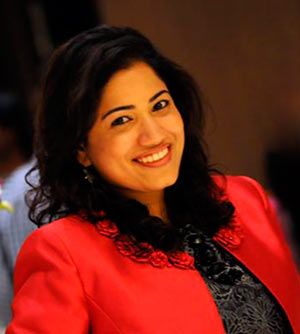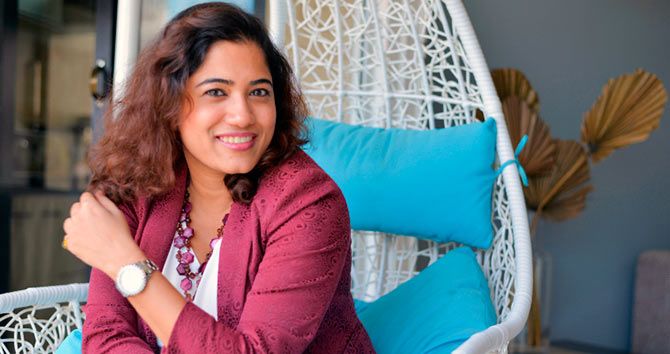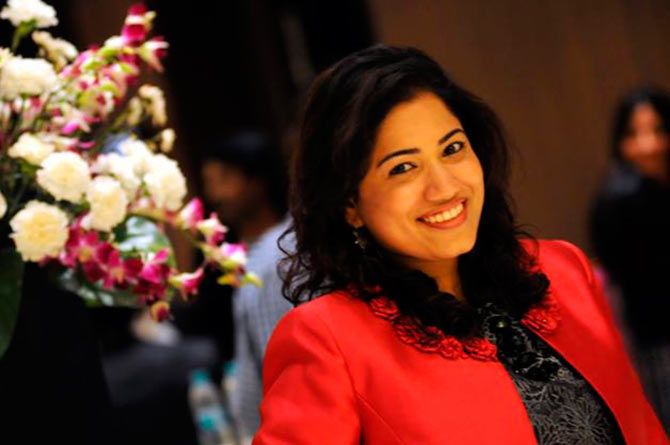
Vaishali Sarwankar is one of the only three Indian women to survive international commodity trading. Here's how she did it.

On the shop floor of international commodity trading, enough obscenities would meet your ears in five minutes that would last a gentleman his lifetime.
It is a hailstorm of aggression and fist-power, as tempers fly around without an anchor.
Vaishali Sarwankar casually paints a hair-raisingly vivid picture of this bloodbath for me -- which, she adds, is just another day in her life; as I marvel on, at the Dunkirk spirit this woman has consistently shown in her two-decade-long career.
She clawed her way out of a Maharashtrian village that frowned upon women desiring to procure a higher education even, to become one of India's only three women in international commodity trading business.
The girl child
Vaishali comes from a typical Maharashtrian family from Konkan, and grew up with three sisters. She did her schooling at a vernacular-medium school in Mumbai.
"Being a family with only daughters, we had our share of rejection from society and family members; we were never treated like our male cousins. But sometimes this rejection itself blazes the trails of your passion in life, and drives you to your goals," she says.
Vaishali owes her robust and driven foundation to her father. "My earliest influencer was my dad, from whom I have learnt what being a man takes. I always wanted to be in the role he played for our family -- someone who the family can depend on."
She completed her higher education from NMIMS in Mumbai, but not without enduring some friction from her filial ecosystem, which continued when she wanted to embark upon her career. "I did always want to be an entrepreneur, but that was considered forbidden for women, as per my societal protocol," Vaishali notes.
She, however, put her foot down and got her way, and hit the professional road as an executive with Bunge India.
'Women have no business being here!'
Starting at the bottom, Vaishali had her eyes on the prize from the word go.
"Usually, when people join an organisation or put in clericaland desk work, they do not aspire big and get into their comfort zone. I never did that, I knew the heights I wanted to scale,"she explains.
Bunge being a corporate MNC, Vaishali was never deprived of reference points and role models to learn the ropes from.
"It's a very aggressive and rough space, unconventional for women. I was in a male-dominated and disorganised business, where the role of women usually ended at executive or managerial level. But if there was one thing my childhood taught me, it is that nothing was impossible. I wanted to take the plunge in this business where women were considered to have no business being. I would observe my bosses cracking deals and speaking to the traders, and started taking the initiative of coordinating with traders myself, at a point," Vaishali says, explaining how she held on.
The plot thickens

Going deeper and deeper into the industry, she realised that the air only gets thinner, due to the nature of work, which was considered 'unfit for a lady.'
Vaishali took over the Atlantic Group of companies, which is into international commodity trading, as the Head of International Trade.
"I have come to understand the finer nuances of the business very well. It was tough initially when I entered the industry, as women were deemed fit enough only to do clerical jobs. We deal with traders who are people at the ground level, on ports. The language is rough and aggressive and abusing is an inevitable part of our business. That's how the conversation goes. People are stressed about the porting, procurements etc. We do not operate formally and politely on mails, but aggressively, in our roughest tone, yelling into the phone at each other. Etiquettes are left far behind in trading industry. But with time you adapt, as trading business ran in my blood. But yes, I had to travel the world scoping out business, meeting the traders, brokers etc,who were all male. I remember days when I was the only woman for business across countries," Vaishali says.
She found that she had to work doubly hard to prove herself and her mettle. "But I was willing to do what it takes, to change this perception. I was prepared to grind it out. Finding my feet in the industry was an unnerving experience, but things only got better with time. Once you master a business, your talent and authority cannot be denied, I discovered, to my relief," she adds.
The numbers soon lined up to prove her point, as she took a $10-million business to $100 million in 2016. "Our vision was to make precisely $100 million in a five-year span, and we have achieved it," Vaishali exclaims.
Not forgetting her roots
But her stellar work does not cease as a business leader. The corporate Czarina believes in giving back to her society, and moonlights as a philanthropist, having championed women empowerment as the cause closest to her heart.
Vaishali has adopted 40 girls from her native place and is hand-holding them to attain the very thing that was taboo in her time- education and professional needs.
Apart from that, Vaishali insists on conducting activities for the women in her company. "I want to break down the societal protocol that upholds gender bias, by empowering the girls in my society to stand up for themselves. To get them there, we arrange grooming sessions for our girls to train them in martial arts, invite industry experts to share their stories with our women employees to create an environment of inspiration," she explains.













 © 2025
© 2025